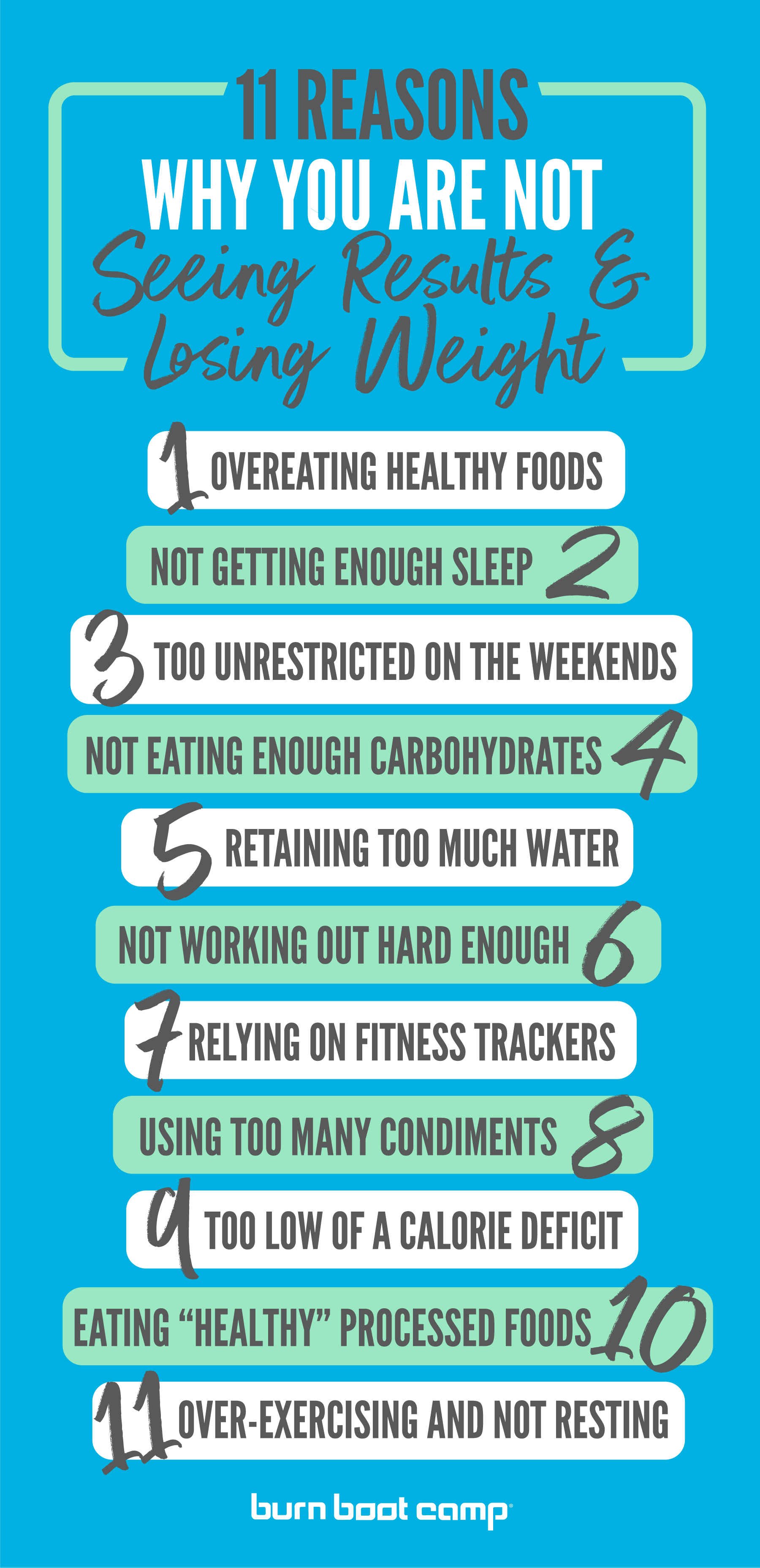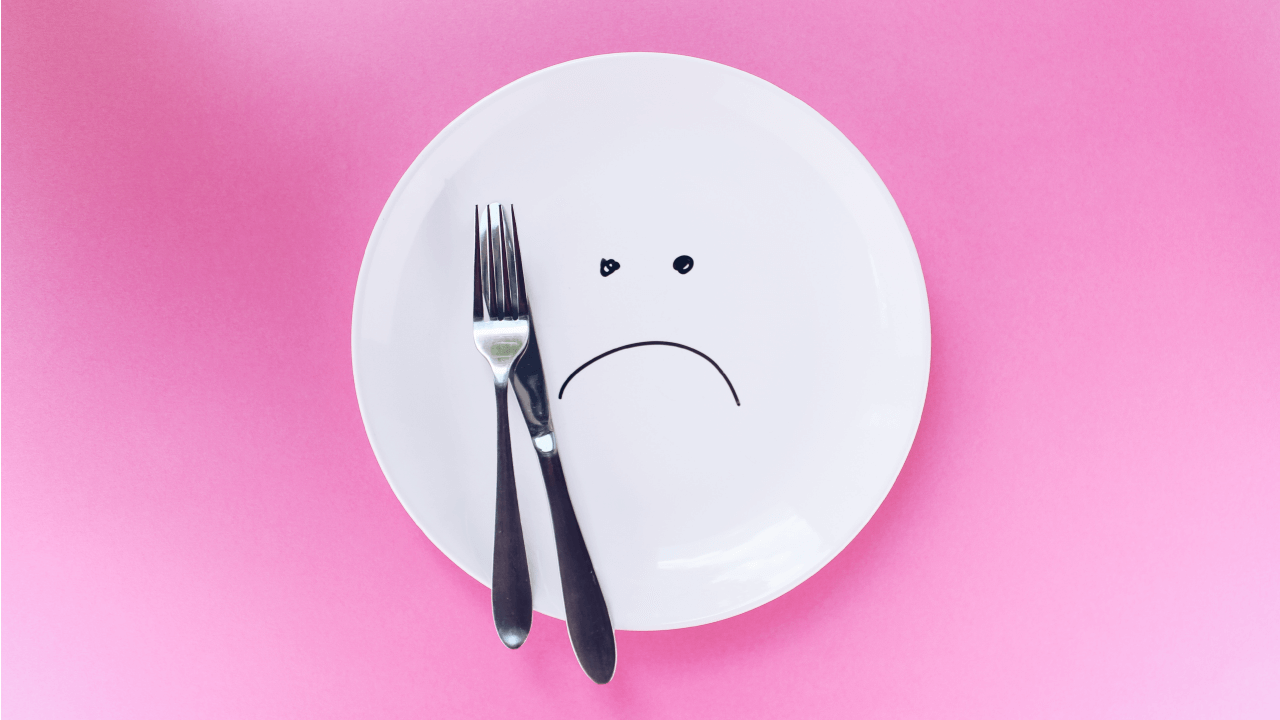By Chelsea Morrow
You’re working out regularly, eating healthy and still not seeing results or losing weight. Or maybe you were seeing amazing results and now you seem to be stuck at a standstill. Either way, you’re frustrated because you are putting in so much effort and can’t figure out why you aren’t getting where you want to be. Check out these 11 reasons you might not be seeing results or losing weight.

1. Do you overeat healthy foods?
We know how delicious almond butter is, and yes, it is healthy for you—but spoonful after spoonful is not! Regardless of the quality of the foods you are eating, portion size remains essential. One serving size of almond butter is two tablespoons, not two heaping scoops. This easily doubles or even triples your fat and calorie intake, and when that’s done with each food at every meal, you’ll end up overeating! Just because a food is considered healthy, it does not give you an excuse to eat too much of it. At the end of the day, a calorie is a calorie and consuming more calories than you expend could be the reason you are not seeing results and losing weight.
2. Do you overeat “healthy” processed foods?
Beware of packaged foods with labels that say vegan, gluten-free, low-carb, low-calorie, low-fat, high-fiber, high-protein, keto-friendly, paleo-friendly, whole-grain, organic or natural. This does not automatically mean these foods are healthy. Many of these products are filled with processed ingredients and could be a reason you aren’t seeing results and losing weight. In most cases, protein pancakes, keto donuts, gluten-free pizza and vegan ice cream are not any healthier than the real deal. Always read the list of ingredients to determine whether the product is actually healthy before falling for its nutritional claims.
3. Are you too unrestricted on the weekends?
You work out hard and eat healthy during the week and deserve to treat yourself, right? So you allow yourself to loosen up on the weekends, unrestrict yourself and indulge in your favorite foods and drinks. Let’s say you start enjoying yourself Friday after work and indulge throughout the entire weekend—that ends up being roughly 35% of your diet. No matter how much you work out or how active you are during the week, for most of us, it’s extremely difficult to outtrain a bad diet. Don’t allow your weekends to be the reason why you are not seeing results and losing weight! Pick one day or a couple meals a week—not the entire weekend—to eat whatever you want in moderation.

4. Do you not eat enough carbs?
Did you know for every one gram of carbohydrates you eat, your body retains three grams of water? So when you drop your carbohydrate intake, the weight loss you experience is primarily from losing water weight. Cutting carbs temporarily may be beneficial for weight loss, but long term it can cause serious problems, especially if you work out regularly.
Many women are sensitive to carbohydrate restriction, causing hormone imbalances that ultimately lead to weight gain. Long-term low-carb diets can decrease thyroid function. As proper thyroid function is directly related to a healthy metabolism, when your thyroid function goes down, your metabolism follows. A low-carb diet also increases stress hormone levels, which can lead to a slower metabolism and increase your appetite and food cravings. It also causes a drop in your muscle-building hormone levels, placing your body in a catabolic state, breaking down muscle rather than building it.
5. Do you over-exercise and not take time to recover?
You may believe that during your workouts you are building muscle and losing excess body fat. What you are actually doing is tearing your muscle fibers and breaking them down. Muscle growth occurs when your body is at rest. Training every single day or hitting the gym twice a day causes you to be in a perpetual state of muscle breakdown, meaning you are continuously losing muscle and never building it.
Overtraining also leaves your body in a chronic state of stress, which negatively affects your hormone levels. These hormone imbalances can elevate your blood sugar, increase your food cravings, heighten your appetite, alter your digestion and slow your metabolism. If you are not seeing results and losing weight, try giving your muscles time to rest, recover and rebuild between workout sessions.

6. Are you not working out hard enough?
Working out every day is amazing for your health, but picking up the same set of dumbells week in and week out or simply going through the motions of each exercise may be the reason you are not seeing results and losing weight. Your body is smart and learns to adapt to the stress it is regularly put under. This is referred to as the SAID principle (Specific Adaptation to Imposed Demands).
Let’s say you did lunges holding 15-pound dumbbells for the first time. Doing so shocked your body and forced it to figure out how to adapt to this new stress by recruiting more muscle fibers and building more muscle. As you continue to use 15-pound dumbbells, your body no longer becomes shocked and doesn’t need to adapt.
If you want your body to change, you have to encourage it by picking up the 20-pound dumbbells. Ensure you are pushing yourself hard enough in your workouts by recording the weight you used, the number of breaks you took and the amount of reps and sets you performed. Work toward beating those numbers to see results and lose weight.
7. Do you track calories burned?
Do you use a fitness tracker to count the number of calories you burn in your workouts? It is a fun stat to follow, but it might not be accurate. Studies have shown that fitness trackers have a large margin of error when it comes to estimating calories burned, somewhere between 20% and 93%! Use these devices to keep you motivated and to gain a general idea of how many calories you burn, but do not rely on them completely. Especially do not add the given total calories burned to your daily caloric intake. With such a potentially large margin of error, doing so can lead to consuming way more calories than you actually burn and may be the reason you are not seeing results and losing weight.
8. Do you use too many condiments?
In many cases, when people add more vegetables, complex carbohydrates and clean sources of protein to their diet, they smother them with condiments to add taste. Most dressings and sauces are packed with processed sugars and oils. Processed sugar spikes your blood sugar, triggering your fat-storing hormone, leading to excess fat storage.
Processed oils are unrecognizable in your body and unable to be broken down into a usable form of energy, also leading them to be stored as body fat. These effects greatly outweigh the benefits of eating more whole foods and may be the reason why you are not seeing results and losing weight. You’re better off making your own condiments from organic, high-quality olive oil, coconut oil, nuts and seeds, tahini, avocados, hummus or tofu to ensure you are fueling weight loss, not weight gain.
9. Do you eat too few calories?
In order to lose weight, you need to create a calorie deficit. But if you cut your calories too low, you will experience the reverse effect. When you eat fewer calories, your body catches on and begins burning fewer calories as well. Your body is unsure as to when it will get more food, so it slows down the metabolism to store body fat rather than burn it. This can cause long-term damage to your metabolism and should be avoided. Signs you are not consuming enough food include lack of energy, hair loss, constant hunger, loss of menstrual cycle, feeling cold, irritability, constipation and anxiety. The average adult woman requires approximately 1,400 calories a day to fuel basic bodily functions, which means you should consume roughly 1,400 calories a day if you are not engaging in any physical activity. The more intense your workouts, the more calories your body will begin to require.

10. Do you not sleep enough?
Depriving yourself of sleep may be the reason you are not seeing results and losing weight. When you’re sleeping, your body releases growth hormones that boost muscle recovery and muscle growth. When you deprive yourself of sleep, you slow down your recovery process, leading you to see results more slowly.
Lack of sleep also plays a huge role in altering your hormones levels. It causes a greater release of your hunger hormone, leptin, and less of your fullness hormone, ghrelin. This causes you to experience persistent hunger throughout your entire day and also heightens your food cravings, especially for processed, starchy, fatty foods. People who are sleep-deprived have been shown to eat 300 more calories than those who get enough sleep. Lack of sleep also spikes your insulin levels, your fat-storing hormone, stopping you from burning fat as fuel.
11. Are you retaining water?
Water retention can be caused from a multitude of things and may be the reason you are not seeing results and losing weight. The most well-known cause is consuming too much salt. ou may also be retaining water from not drinking enough water, eating too many carbohydrates, exercising too much, not sleeping enough, high levels of stress or too low of a calorie deficit. Due to water retention, the scale may not be showing you lost weight, but you might still be losing fat. Try staying hydrated, reducing your sodium intake, getting enough sleep and monitoring your carbohydrate intake to help you stop retaining water. Giving your body more electrolytes has also shown to be beneficial.

Chelsea Morrow is a certified personal trainer and yoga instructor. After a six-year career as a professional figure skater, she now works at Burn Boot Camp HQ on the Marketing team and is passionate about educating all of Burn Nation about fitness, nutrition, and a positive mindset. Chelsea is also the author and mastermind behind The Blueprint, Burn Boot Camp’s weekly newsletter. She loves doing yoga, meditating, rock climbing, her dog Yogi, and eating Mexican food.



Great information!! Thanks for sharing your knowledge!!
Pam Glazebrook
Is there anything you can do to counteract the lack of sleep? I wake up 6 – 7 times every night. I have not slept a night through in years.
How much does a week long visit cost